How these Topeka businesses are seeking alternatives to overburdened health care system
Burnout, administrative red tape and the breakdown of provider-patient relationships are just a few of the reasons medical professionals give for the alarming rate at which they’re leaving health care.
The Journal of General Internal Medicine published a study last year indicating that more than 25% of medical personnel are considering leaving the industry entirely. The same study found that although the COVID-19 pandemic compounded issues facing the medical community, it was simply the straw on the back of an already overtaxed system.
Some local providers are looking for alternative ways to practice medicine outside of the large corporate settings they say lead to the vast majority of problems plaguing the country’s health care system today. These are their stories.
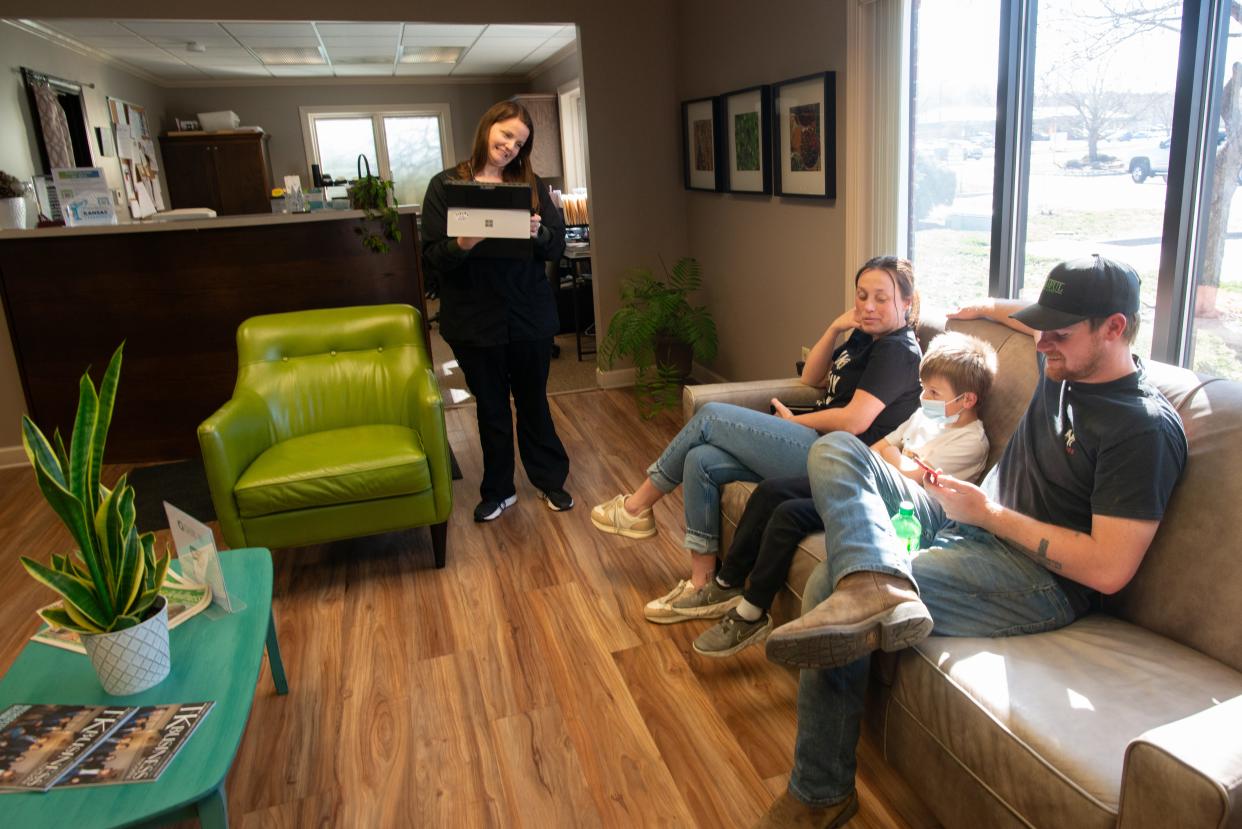
Practicing disease prevention
Amanda Whitson is a nurse practitioner who previously worked in the intensive care unit of a major hospital. There, she saw firsthand the impact that chronic disease has on patients and their families.
“Many of these conditions could have been prevented,” said Whitson. “It didn’t have to be this way.”
Whitson, along with board-certified family nurse practitioner Kelsey Stringer, co-founded Epic Integrative Wellness, a new health clinic that opened Jan. 1 in southwest Topeka. Whitson and Stringer established their business with the goal of empowering patients to take control of their own health care.
“Ethics and integrity are at the foundation of everything we do,” said Whitson. “We provide patients the quality of care we would expect for our own families. To do that, you have to own it, and we said, ‘Why not us?’”
Stringer, a lifelong athlete and former ER nurse, was looking for opportunities outside of traditional medical models where providers are encouraged to focus on treating and managing symptoms of disease. Instead, Stringer and Whitson set out to provide preventative care that sought to address potential problems before they became chronic conditions.
“Our passion is prevention,” said Stringer. “Getting to the root cause of symptoms. We look at water intake, diet, gut health and hormone balance.”
She said she believes that now is the time to shift from a reactive approach toward prevention, as patients become more aware of how much money goes to corporate health from individuals with chronic illnesses.
“People are developing diabetes, cancer and other conditions at younger ages, and we’re heading down a really dangerous path, especially with the food system in this country,” said Stringer. “It’s a dangerous route that leads to chronic diseases.”
Whitson, who completed a fellowship with the American Academy of Anti-Aging Medicine, helps patients achieve hormone balance and fight inflammation as they age. She said many of the diagnostic tests used at Epic Integrative Wellness aren’t used in traditional health care models because of the time required to properly investigate, diagnose and treat certain conditions.
Insurance companies don’t allow providers to spend time on these issues because it’s simply not profitable to do so.
“Perimenopause and menopause care are not well-reimbursed by insurance companies,” said Whitson. “Your doctor may not know what to do with your menopause because they are offered very little training on how to handle it.”
In addition to hormone balancing treatment, Epic Integrative Wellness offers medical weight loss services, lab testing to assess gut health, food sensitivities and allergies, IV infusions, sexual health prescriptions and more. Clients take the lead in choosing how to address potential concerns, with the provider playing the role of adviser.
“It gives people the option to be in the driver’s seat of their own health care,” said Stringer. “And it appeals to health care providers because we have more control over how we care for our patients. It’s a partnership. So many physicians, nurse practitioners and physicians’ assistants are the most compassionate and wonderful people you’ll ever meet. They want to help people, but they don’t have time to do it in this way.”
Epic Integrative Wellness doesn't accept insurance, which allows the clinic to avoid dictates by insurance companies on how often a patient can be seen, available treatment options and route of treatment. Instead, they use a fee for service model.
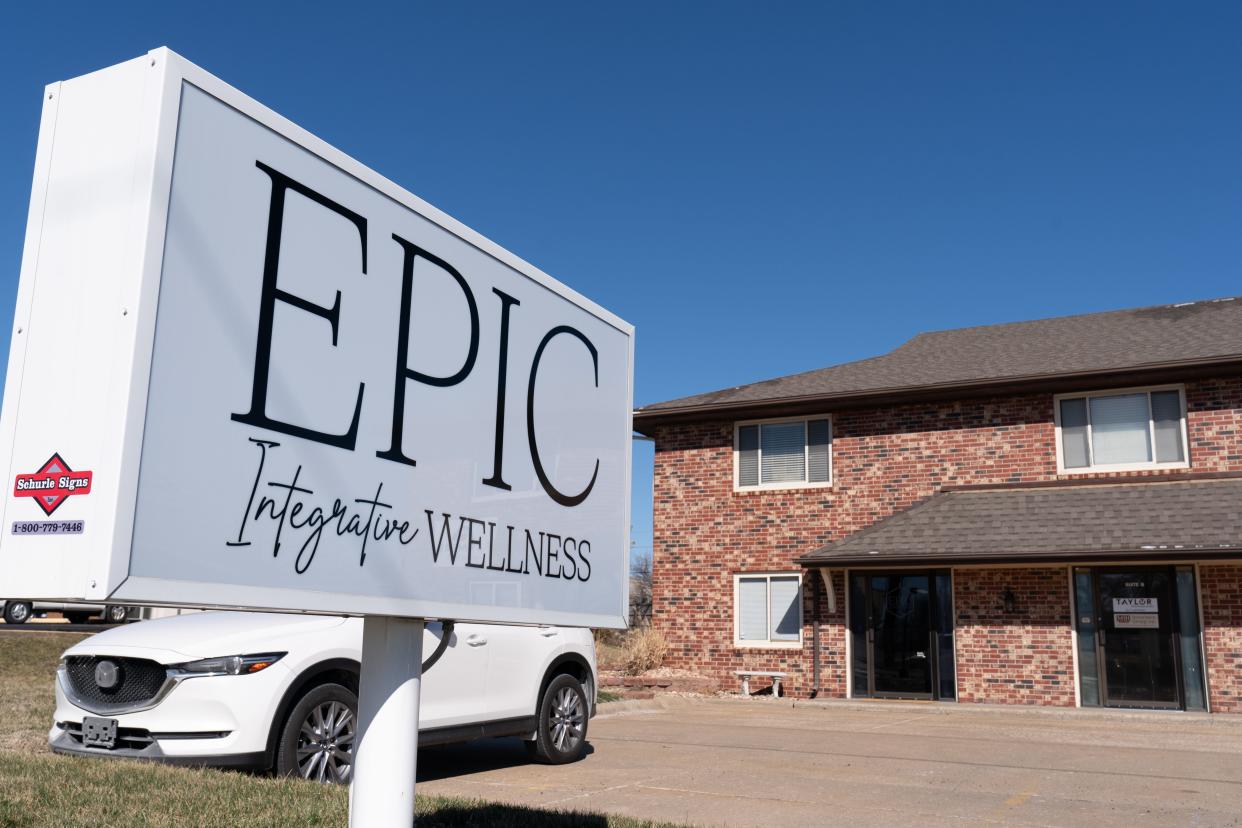
“Doctors are mandated and compensated by insurance companies to see as many people as they can. It’s a systemic problem that causes burnout,” said Whitson. “Part of the appeal of cash pay is it leaves the middle man out.”
According to Whitson, the average time a doctor in corporate medicine is allowed to spend with a patient is about six minutes.
“It’s about having the time and opportunities to get to know our patients and their lifestyles,” added Stringer. “We can take time to look into how people are living their lives and help them understand what’s going on in their body and how inflammation can lead to chronic diseases. It’s a different way of looking at health.”
Stringer said the perceived expense sometimes deters patients from trying cash pay offices, but Epic Integrative Wellness works to help people save as much money as they can. Clients have the ability to use their FSA and HSA dollars for services at the clinic as well.
“We wanted to bring access without having cost be a complete hinderance,” said Stringer. “Our goal is to share our passion so that patients can be confident in their own wellness journey. We want them to know what they’re taking, why and for how long, and they need to understand the reasons behind what they’re doing so they can be active participants in their health care.”
Developing trust in provider-patient relationships
Jared Schreiner, director and chief medical officer at Topeka ER & Hospital, has spent his career as an emergency medicine physician in large corporate hospitals and smaller acute care settings. He says such micro hospitals as Topeka ER are gaining in popularity across the country because of their ability to leave a smaller footprint.
“Research in the early 2000s found that smaller hospitals could run more efficiently when positioned throughout the community. They’re more easily accessible to patients and run more economically,” said Schreiner.
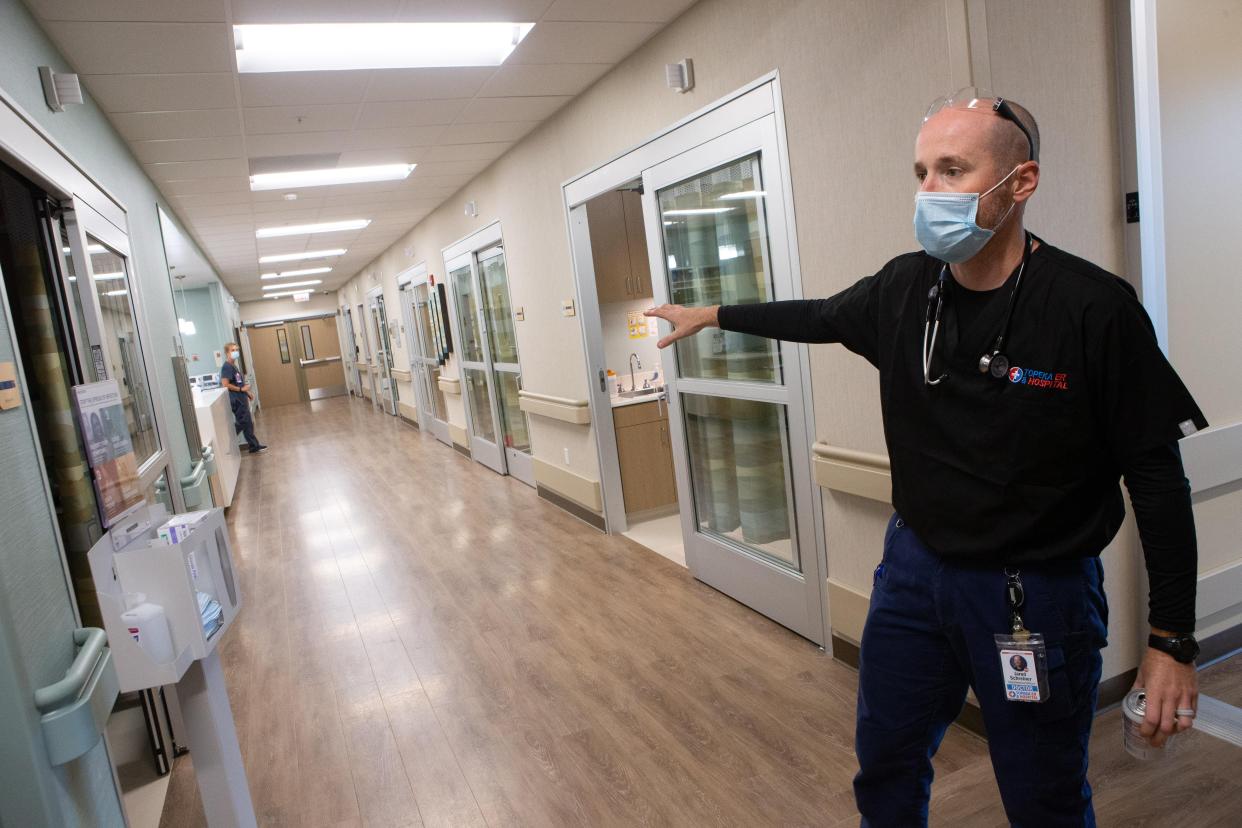
A physician-owned facility and the first independently owned micro hospital in Kansas, Topeka ER & Hospital opened in July 2020. Micro hospitals are licensed in the same way as traditional hospitals, but due to fewer administrative costs and lower overhead, they’re less expensive to operate.
Schreiner said micro hospitals have been linked to better health outcomes for patients, who tend to seek care sooner before they become really ill.
“They’re close, the parking is easy, it’s less intimidating, and the wait times are shorter," he said. "Some patients come to us because they’ve been sitting in an ER waiting room for six to eight hours waiting to be seen. Our wait time is usually less than three minutes from door to doctor.”
He said Topeka ER & Hospital is equipped to handle any emergency, treating everything from broken bones and appendicitis to gunshot wounds and heart attacks. In the event that surgery or ICU-level care is necessary, staff stabilizes the patient and works with Topeka-area medical centers to transfer for appropriate treatment.
The facility employs 40 to 50 medical personnel, with 10 board-certified emergency medicine physicians, along with specialty providers, hospitalists and pediatricians. Micro hospitals offer most of the services that larger hospitals provide.
Topeka ER has an ambulance bay, trauma room and eight emergency beds. Same-day lab, radiology and pharmacy services are on site as well.
Patients who need to be admitted while they recover can do so in one of six private in-patient rooms. Schreiner said their average in-patient stay is less than two days since a doctor is able to see patients two to three times per day, expediting care.
“Time in hospital is the biggest cost savings for patients," he said. "Their time in hospital is significantly less, so you spend less time and less in lost wages for patients who have to leave work to be seen.”
Schreiner said the biggest misconception that Topeka ER & Hospital faces is that they won’t accept insurance. He wants the public to know that the facility does accept commercial insurance coverage through providers like Blue Cross Blue Shield, Aetna and Cigna.
The confusion might stem from the fact that Topeka ER is considered an out-of-network provider by insurance companies.
However, Schreiner said federal legislation requires insurance providers to cover emergency room visits and pay for emergency care at in-network rates, even if a facility is labeled out-of-network. Patients have the same coverage at Topeka ER & Hospital as they would have at either of Topeka’s two major health care centers, and they are only responsible for co-pays and deductibles required by their individual insurance plans.
Topeka ER isn't currently accepting public insurance such as Medicare and Medicaid, but they do offer cash pay options for people without insurance or with high deductible plans; a practice that can be less expensive for some patients in the long run.
“We work with people with high deductible insurance plans. Some patients choose to pay cash because our cash prices are cheaper than anywhere else,” said Schreiner. “When hospitals contract with insurance companies, the language in the contract prohibits them from negotiating cash prices.”
Schreiner said he believes that the cost savings and efficiency provided by micro hospitals leads to higher overall patient satisfaction because they are more comfortable and feel better cared for. He said there are benefits for providers as well.
“The desire to do medicine the way we think it should be done. I get to practice medicine the way I want to,” said Schreiner. “I don’t feel rushed, and I have more time to talk to my patients. The corporate practice of medicine has led to the degrading of quality in the patient-doctor relationship.”
He offers the example of a patient from out of town who was reluctant to be treated overnight because he had his dog with him. Schreiner called his parents who picked up the patient’s dog and cared for the animal while the patient recovered.
“That’s the kind of thing we can do here,” said Schreiner.
Using health care dollars wisely
Jennifer Harader, physician, and Holly Cobb, advanced practice registered nurse, have operated Oasis Family Medicine in Topeka for the past nine years. As direct primary care providers, they believe that good primary care is personal and affordable.
“We offer full-spectrum family medicine and primary care with a broad scope of services, operating at the top of our training,” said Harader. “We’re able to offer more because we don’t have insurance contracts.”
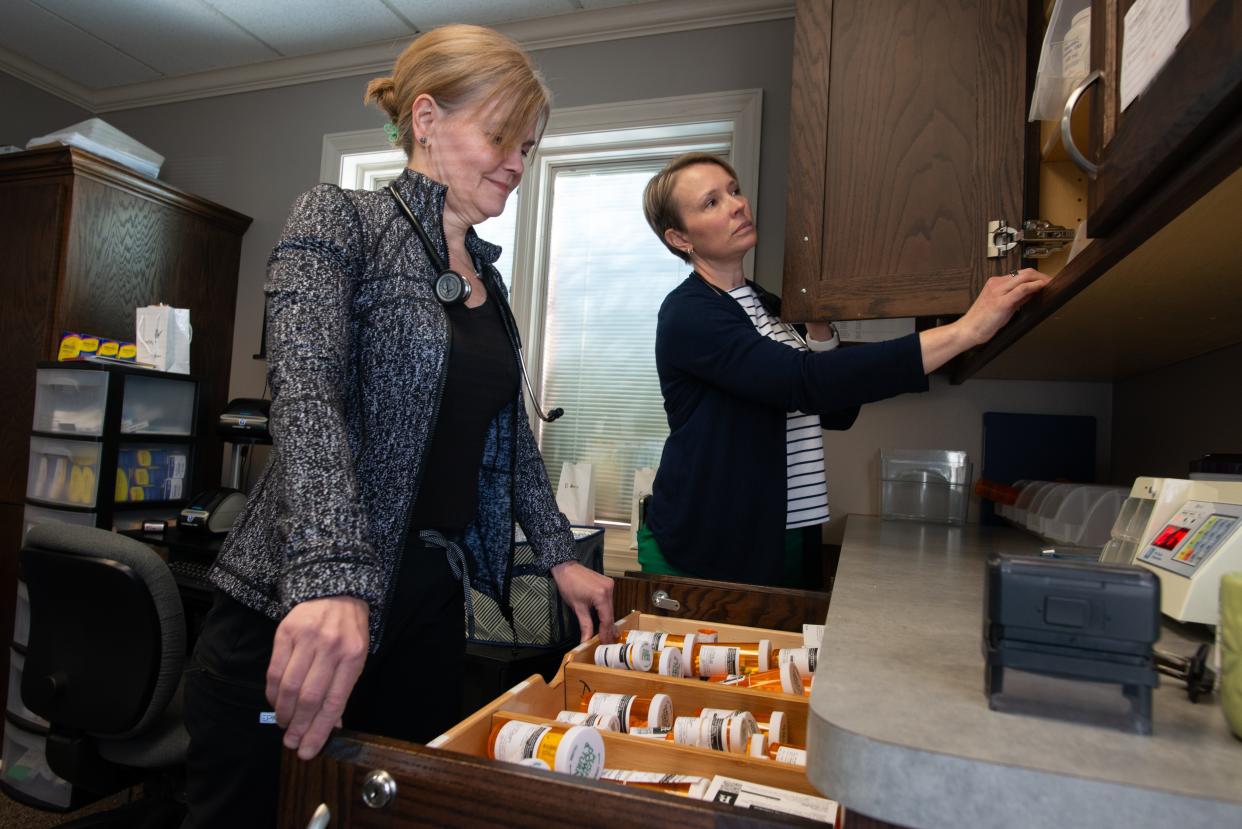
Oasis Family Medicine operates on a membership model, charging patients a monthly fee for access to unlimited visits and discounted pricing for special labs and procedures. Providers at Oasis do a large number of procedures in clinic and make more diagnoses in-house than other providers who would otherwise refer patients out to specialists.
“In big health care systems, you’re rewarded when you refer patients to a specialist,” said Cobb.
“We are broadly trained in family medicine to take care of a wide variety of conditions,” said Harader. “There are things I couldn’t do in my previous practice because I didn’t have the time. It was expected those things would be referred out. We can avoid fracturing of patient care and keep what’s appropriate in house, and the patient’s wallet is healthier for it, too.”
Prior to founding Oasis, Harader worked in corporate health care, seeing a caseload of up to 3,500 patients.
“I realized it was not going to be sustainable for the level of care I wanted to give my patients or for having a life outside of medicine, so I could be the spouse and mom I wanted to be,” she said.
Cobb approached Harader with an idea for a new model of health care, and they suddenly found themselves small business owners. Their objective was to offer patient care in which medical decisions were made by patients and providers without interference from third-party payers.
Employees at Oasis Family Medicine are medical professionals who treat such chronic diseases as adult diabetes and high blood pressure, as well as work to address mental health concerns, provide urgent care, sports medicine and annual physicals. They can also perform minor procedures, including suturing and skin biopsies.
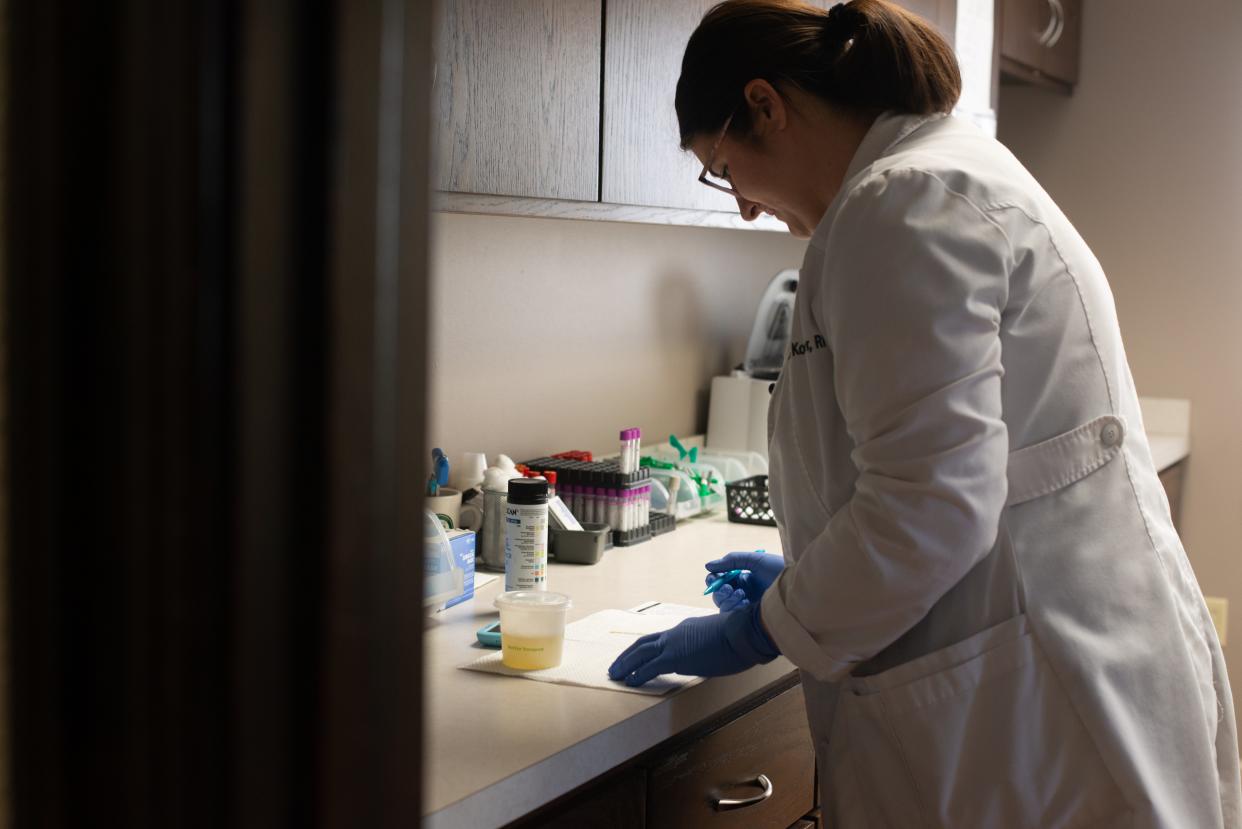
Without insurance companies driving reimbursement rates, providers at Oasis are able to limit their practice of medicine to 700 patients per provider, offering more thorough and attentive care. While a typical medical appointment at Oasis lasts about 30 minutes, providers have the ability to spend up to 90 minutes with a patient if that’s what it takes to address their health care concerns.
Members enjoy personal communication, including in the evening and on weekends via email, texts and phone calls. Harader and Cobb said this level of access helps patients avoid unnecessary office visits because they can send their questions and receive answers directly from their provider.
Each household at Oasis Family Medicine pays a one-time $50 enrollment fee. Monthly membership fees are based on a tiered payment model determined by the patient’s age and include annual physicals, unlimited office visits, communication with the provider, house calls, specialist coordination, EKGs, rapid strep screenings, urine analysis and more.
Members aren’t responsible for co-pays, and patients and providers discuss any additional treatment not covered by membership fees together before determining a treatment plan.
“We’re able to be so much smarter with money than the big systems because we don’t have someone outside of medicine who processes the claims,” said Cobb. “Big, bloated health care systems are priced much higher because so many people are involved, and you don’t have medical people leading those efforts.”
She gives the example of a patient who required a splint. Instead of being forced to use marked-up pricing set by an insurance company, Oasis was able to order the product for the best price on Amazon and save the patient money.
“We know the cost of things. In big systems, they don’t know the cost of anything,” said Cobb. “We can have really smart conversations about how to use a patient’s health care dollars.”
With medical debt the No. 1 reason for bankruptcy in the United States, Harader and Cobb said saving the patient money is especially important. Some patients avoid going to the doctor because they don’t feel like they can afford care, and Harader and Cobb want the public to know that primary care can be inexpensive.
Oasis patients have access to an onsite dispensary with prescriptions at wholesale prices that are often for less expensive than pharmacy co-pays. An annual lab workup panel is less than $30, and an MRI that costs $2,600 with insurance is roughly $600.
“That’s the craziness of the health care system,” said Cobb. “Patients can have confidence in what they’re going to be charged with us.”
Some small businesses and local employers, including Advisors Excel, are turning to direct primary care models to address the rising cost of insuring their employees and keeping them healthy.
“Our goals are the same,” said Cobb. “Healthy, productive people.”
Oasis Family Medicine does treat patients who have health insurance, although they are required to sign a waiver stating that they won’t bill insurance for services they receive. Harader and Cobb recommend that patients carry health insurance to cover catastrophic accidents or major health issues.
Most of the clients at Oasis have significantly reduced their insurance premiums by using high deductible, low premium insurance plans along with a health savings account and a membership through Oasis.
“This is a different opportunity to get your health care and take control of your options if you’re dissatisfied with the current system,” said Cobb.
Oasis recently began accepting new patients after hiring an additional provider. Harader noted the shortage of primary care professionals across the country at this time.
“Primary care is underserved, and there’s a huge burnout rate,” she said. “If this model was employed more often, I think that could be prevented. We love our jobs and our business. It’s a great way to provide care. Our staff is second to none at being compassionate, and our members don’t wait in line.”
This article originally appeared on Topeka Capital-Journal: Topeka businesses seek alternatives to overburdened health care system
